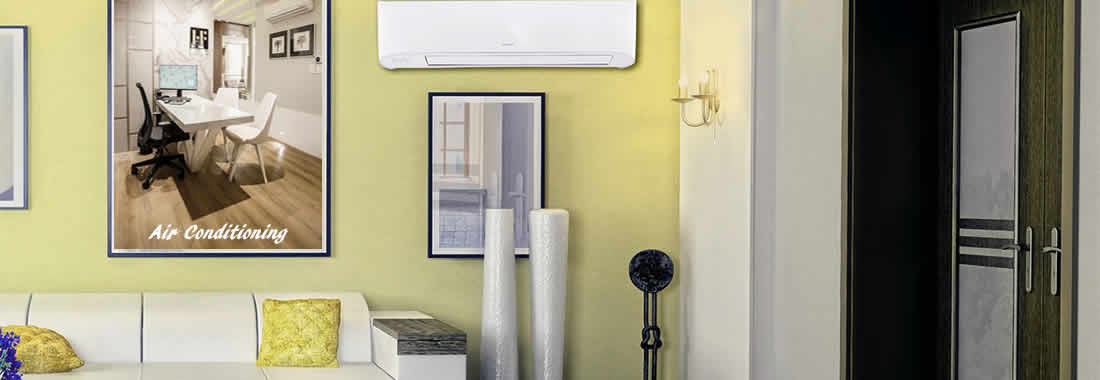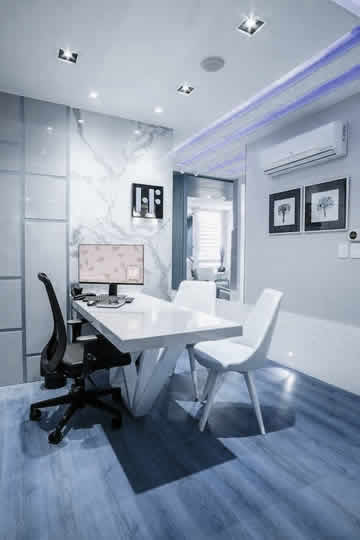
Air Conditioning: What it is and How it Works
Many homes and places of work have air conditioning installed to help maintain a comfortable living and working environment.
Let's take a look at what air conditioning is and how it works, while also looking at what is needed to keep it running efficiently over the long term.
What Air Conditioning Is
Air conditioning is the process of controlling the temperature, humidity and quality of air in a given space.
It's usually used to cool rooms or buildings but can also heat, ventilate and dehumidify. AC systems can be employed both residentially and commercially and in some locations, they are even essential for providing comfortable indoor environments during hot climates.
How Air Conditioning Works
 Air conditioning works by moving room temperature air through what is called an evaporator coil cooled by refrigerant, then redistributes the now cold air through the room.
Air conditioning works by moving room temperature air through what is called an evaporator coil cooled by refrigerant, then redistributes the now cold air through the room.
As this warmer air passes over the cold coil, it cools down and is then distributed throughout the building for a comfortable temperature and humidity level.
All air conditioners produce a similar amount of hot, moist air as dry, cold air as a result of the heat-exchange process in the refrigeration stage. This is similar to how a domestic refrigerator produces hot air out the back while keeping its interior cold.
Main Air Conditioner Types
There are several different types of AC appliance, each designed to cool a variety of different spaces, sizes and configurations.
Let's take a look at the more common types of AC and see where they are best suited for installation.
Mini-Split AC
The most common air conditioning system is a split system, consisting of an indoor and outdoor unit.
The indoor unit contains the evaporator coil, fan, and other components while the outdoor one houses the condensing coil and compressor. These two units are linked via refrigerant lines which transfer heat from inside to outside.
Central Air
Central air systems, also called Heating, Ventilation and Air Conditioning (HVAC) systems are also popular especially in larger buildings.
This type of system is run by a central heating and cooling unit and distributes air throughout the building through ducts built into the walls, floors and ceilings.
Self Contained AC Units
Single cooling units like window AC, PTAC and portable AC units are smaller and designed to provide cooling for a single room.
Each is best suited to certain appliacations.
Window AC
Window AC units are common in buildings where there is no central air and the owner cannot afford to install a mini-split system.
Window units cool the room they are installed in quite efficiently. However, they take up space in a window opening, reducing the amount of natural light entering the room.
They take the warm air from inside the room and cool it before pumping the cold air back into the room. The hot air that is produced in the process is vented to the outside through the unit.
PTAC
PTAC (Packaged Terminal Air Conditioner) units are also self-contained coolers similar to window units, with the difference being they are installed against an external wall in a room and not directly into a window opening.
PTAC units are most often seen in hotel/motel rooms and in some hospital wards and health centers.
Portable AC
Portable AC units are generally the least expensive types of AC to buy, but are less efficient than window units and can end up costing more to run.
Portable units are more flexible, being free standing and possible to move from room to room as needed. However, this type of unit must be connected to a suitable outlet to allow for the exhaust of the hot air to the outside.
Air conditioning systems must be appropriately sized for the space they are cooling. If it's too small, it won't be able to cool the space efficiently; on the other hand, if it's too large, it may cycle on and off too often leading to higher energy costs.
Benefits of Air Conditioning
Having air conditioning installed in your home or office offers several advantages during hot weather, such as:
- Comfort: Cooling a space can make it much more hospitable, especially during hot climates.
- Air Quality: Air conditioning can improve indoor air quality by eliminating dust, pollen and other particles.
- Health Benefits: Cooling a space can help to reduce the risk of heat-related illnesses like heat exhaustion and heat stroke.
- Energy Efficient Design: Air conditioning can make a space more energy-efficient by maintaining temperature stability.
- Safety: Air conditioning can make a space safer by decreasing the risk of fires and making it simpler to detect smoke or carbon monoxide emissions.
Disadvantages of Air Conditioning
The main disadvantage of running any kind of AC system is the running cost of consuming energy.
Electricity prices are continually rising, whereas AC efficiency has effectively reached its peak in the current design and configuration. This means that it will continue to be ever more expensive to run the AC during hot weather.
AC systems also require regular maintenance to keep them running as efficiently as possible, which adds an additional cost to the household budget.
Maintaining an Air Conditioning System
Whether you know it or not, air conditioning systems need regular maintenance in order to function optimally.
Maintaining air conditioning systems is essential for their efficiency and long-term durability. Regular upkeep will enable your system to run more efficiently and ensure optimal performance.
- Change Air Filters Regularly: It is recommended to change air filters at least every three months in order to keep your system running optimally.
- Check Refrigerant Levels Annually: To guarantee the system remains functioning optimally, inspect refrigerant levels annually.
- Clean Coils: Both the evaporator and condenser coils should be cleaned to eliminate dirt and dust accumulation.
- Inspect Belts and Hoses for Wear Signs: Check belts and hoses for signs of wear and tear.
- Examine Electrical Connections: It is important to inspect electrical connections for signs of corrosion or damage.
Summary
Air conditioning is a critical element of creating a comfortable indoor environment and it offers numerous benefits like improved air quality, health benefits and energy efficiency.
But for it to work optimally, proper sizing and upkeep are necessary for it to run efficiently for many years. Regular inspections and maintenance help guarantee your system runs smoothly so you can enjoy many years of trouble-free operation.
Enjoy the summer weather outdoors then retire to a cool and comfortable indoors whenever you want to, thanks to the marvel that is air conditioning!
You can also watch the video below for more information:
- Copyright © hvac.pages.dev All rights reserved
- Privacy
- Site Map